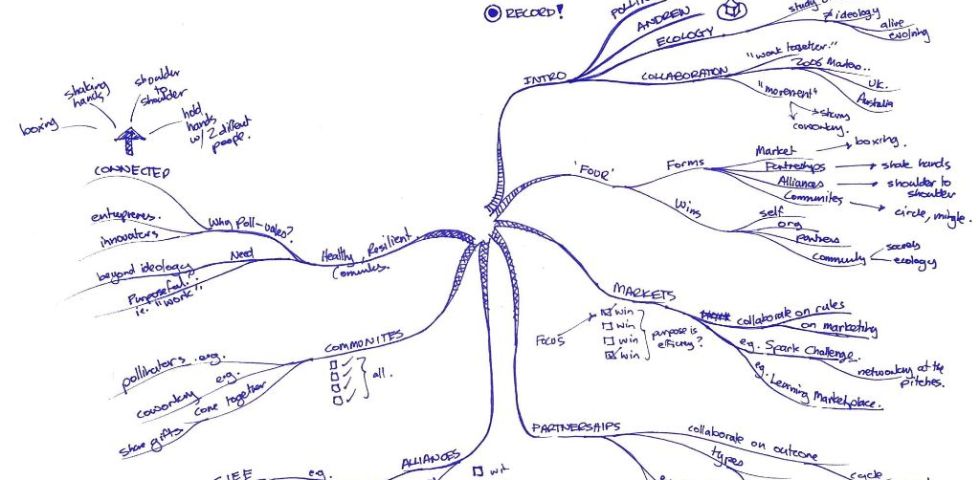Blues for the Bush combines a open day with evening entertainment at Bush Heritage Australia’s Charles Darwin Reserve, east of Perenjori. As part of the open day, Gunduwa Regional Conservation Organisation hosted a series of presentations on ‘collaboration’. Guiding questions for speakers included: Why collaborate, what is it all about, and is it ‘old’ or ‘new’.
Collaboration is one of Pollinators values and guiding principles, and I was invited to present and used the opportunity to share some of the learnings I’ve had prior to and during my work in social innovation, entrepreneurship and most recently with Pollinators Inc. Below you can view a slideshow, the mindmap notes used to guide the talk, and listen to the 20-minute presentation itself.
What you don’t get to see (though you can hear the instructions) is the fun ’embodied’ versions of the four types of collaboration, where everyone in the tent got to stand up, try to hit each other, shake hands, stand shoulder to shoulder then link hands as an enmeshed community.
Some of the points covered in the talk included:
- Collaboration simply means working together
- Win-win-win-win outcomes are possible for the individual, organisation, collaborators and society. Any collaboration could be assessed against the 4 types of win
- “Markets” enable collaboration through agreement on ‘rules’. Even though markets can look like they are full of competition, its also true that rules of football or boxing enable the players or fighters to collaborate to entertain us : ) Markets can lead to ‘win’ outcomes for individuals (e.g. supermarket shoppers who want the lowest price) and society (e.g. carbon market reducing overall emissions), but usually an organisation will ‘lose’ (e.g. because they are uncompetitive).
- “Partnerships” are the most common form collaboration, and are often constrained to a particular timeframe and purpose. They usually result in a ‘win’ for the organisation and collaborators, but may not be a win for individuals or society.
- “Alliances” are commonly formed by organisations who may have aligned ideological or outcomes. In my experience, alliances usually ‘cost’ the organisations in the short term (i.e. not necessarily a win), and are formed around a longer-term, society-scale impact (i.e. a win for society).
- “Communities“, whether based on shared interest or geography, are very enabling of collaboration. This is what happens in coworking spaces, in small towns through virtue of people just knowing each other enough to work together.
Cast studies referred to include:
- Spark Challenge in the UK (now completed)
- Interface Carpets
- Learning Marketplace
- Social Innovation, Enterprise and Entrepreneurship Alliance (now disbanded)
- Greater Geraldton Futures Governance Alliance and others (also disbanded)
- Pollinators ‘Social Enterprise and Innovation Ecosystem‘
AUDIO (Starts after 1 minute)
SLIDES (listen to the audio simultaneously)












No comments yet.